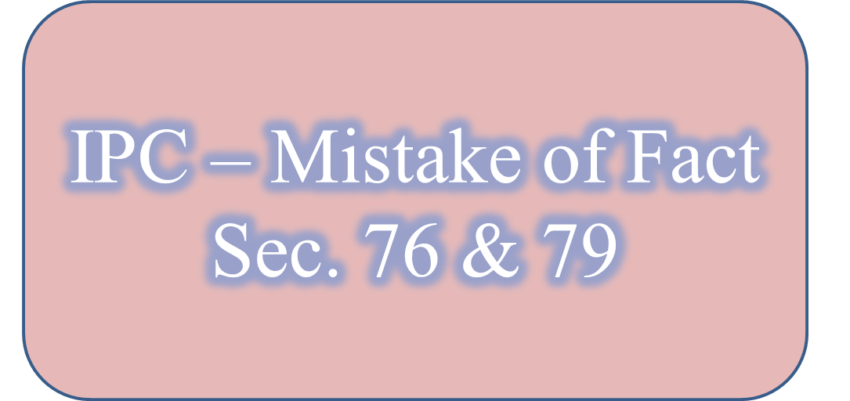IPC- Mistake of Fact
Ch.4 – General Exceptions Mistake of Fact
Sec. 76 and 79 are based on the Latin maxim ignorantia facti excusat and ignorantia juris non excusat which means ignorantia of fact is an excuse, ignorance of law is no excuse.
Sec. 76
Sec. – 76. “Act done by a person bound, or by mistake of fact believing himself bound, by law.”
- An act done by a person who is bound by law to do that act or
- An act done by a person who believes himself to be bound by law to do that act
- The belief must be by reason of a mistake of fact and not by reason of a mistake of law.
- The belief must be a bona fide in good faith.
If all above conditions are fulfilled in doing any act then the act is exempted under the code from criminal liability because the act shows absence of mens rea.
Illustrations:-
(a) “A, a soldier, fires on a mob by the order of his superior officer, in conformity with the commands of the law. A has committed no offence.”
(b) “A, an officer of a Court of Justice, being ordered by that Court to arrest Y, and after due enquiry, believing Z to be Y, arrests Z. A has committed no offence.”
Cases relating to sec 76
R. v. Tolson, ( 1889) 23 Q.B.D. 168,
In this case the accused was convicted of bigamy. She had gone through the ceremony of marriage within seven years after she had been deserted by her husband. She believed in good faith and on reasonable grounds that her husband was dead. It was held that a bona fide beliefs on reasonable grounds in the death of the husband at the time of the second marriage afforded a good defence to the charge of bigamy.
R.v. Princes,(1857) L.R. 2 CCR 154,
In this case the accused was charged of unlawful taking an unmarried girl under the age of 16 years out of possession and against the will of her father. It was found that the accused bona fide and reasonably believed the girl to be older than 16 years. The accused’s mistaken belief about the age of the girl was held not to be a good defence to an incitement for kidnapping because he intended to do and did a wrongful or Immoral act and not an innocent act
Latif Khan V state, (1895) 20 Bom 394; Gurdit Singh, (1883) PR No. 16 of 1883
For illegal acts, however, neither the orders of a parent nor a master nor a superior will furnish any defence. Nothing but fear of instant death is a defence for a policeman Who tortures anyone by order of a superior. The maximum respondeat Superior has no application to such a case.
State of WB v Shew Mangal Singh, 1981 CrLJ 1683: AIR 1981 SC
If superior order is in conformity with the law no further question arises and the subordinate officer is protected by section 76 IPC, 1860 if he carries out that order. If is only when the order is not in accordance with the law but the subordinate officer who carries out that order in good faith, on account of a mistake of fact and not on ground of mistake of law, believes himself to be bound by law to carry out such an order, that a further question arises as to whether the subordinate officer will not still get protection of section 76 IPC, 1860 because of his mistake of fact.
Thus, where the order was legal in the circumstances of the case,
For an example, where the police petrol party opened fire under the Order of the Deputy Commissioner of Police after it had been attacked on a dark night and an assistant commissioner of police had been injured as a result of such attack, really no question arose for the application of section 76 IP, 1860, as the order was both legal and justified by the circumstances of the case.
Shew Mangal Singh, 1981 CrLJ 1683: AIR 1981 SC
The Indian law as contained in section 76 and 79 of The Indian Penal Code appears to be the same as in England. This point has, however, not been clearly decided in any case including the decision of the Supreme Court in Shew Mangal Singh’s case.
Chaman Lal, (1940) 21 Lah 521
There are, however, enough indications in Shew Mangal Singh’s case and in sections 76 and 79 IPC, 1860, that if the subordinate due to a mistake of fact and not due to a mistake of law honestly believed that he was bound or justified by law in carrying out the superior order which though not manifestly illegal was nevertheless illegal, perhaps he would still get the benefit of Superior order. Obedience to an illegal order can only be used in mitigation of punishment but cannot be used as a complete defence.
A K Chaudhary v State of Gujrat, 2006 CrLJ 726 ( Guj.)
If, the employee has committed suicide on account of any abnormal reaction, the conduct of the complainant or of higher officer of taking departmental action by way of resorting to legal remedy or enforcement of law, cannot be termed as leaving no option to the delinquent employee but to commit suicide and therefore, cannot be said as abatement or incitement to suicide under such circumstances. In any case any action for resorting to legal remedy for grievances or for enforcement of law in exercise of powers or purported exercise of power cannot be said to contain any element of criminality unless such action is ex facie without any competent, authority or jurisdiction.
Sec. – 79. “Act done by a person justified, or by mistake of fact believing himself justified, by law.”
- An act done by a person who is justified by law to do that act or
- An act done by a person who believes himself to be justified by law to do that act
- The belief must be by reason of a mistake of fact and not by reason of a mistake of law.
- The belief must be a bona fide in good faith.
If all above conditions are fulfilled in doing any act then the act is exempted under the code from criminal liability because the act shows absence of mens rea.
Illustration
“A sees Z commit what appears to A to be a murder. A, in the exercise, to the best of his judgment exerted in good faith, of the power which the law gives to all persons of apprehending murderers in the fact, seizes Z, in order to bring Z before the proper authorities. A has committed no offence, though it may turn out that Z was acting in self-defence.”
Cases relating to sec. 79
Raj Kapoor v. Laxman, AIR 1980 SC 605
Section 79 makes an offence a non offence. Only when the offending act is actually justified by law or is bonafide believed by mistake of fact to be so justified.
State of Orissa v. Bhagaban Barik, AIR 1987 SC 1265
Under this section, although an act may not be justified by law, yet if it is done under a mistake of fact, in the belief in good faith that it is justified by law it will not be an offence. In this case the accused struck a person with a full force Lathi blow thinking that he was a thief and he had to do so to safeguard his property. The incident took place outside the house near a pond. The place was away from the house. There being no occasion for private defence of property and the blow being given on the head with severity. it was held that the accused was liable to be convicted under section 304 part 2. He was sentenced to three years RI.
The question of good faith is always a question of fact to be determined in accordance with the proved facts and circumstances of each case.
Chiranji, (1952) Nag 348
Where an accused owing to a defect in his vision and the effect of a fall Bonafide believed that his son of whom he was very fond was a tiger and caused fatal injuries to him with an axe in a moment of delusion, he was protected under this section, and his act being done under a bonafide mistake, he could not be convicted of an offence of murder.
Satyaveer Singh Rathi v. State Thr. CBI,AIR 2011 SC 1748
Unprovoked firing by appellants who were police officials caused death of two persons and grievous gun-shot injuries to another person. Seven police officers admitted firing into the vehicle. But the defence case was that they had done so only on the direction of ACP, a superior officer. The supreme Court held that it can not, by any stretch of imagination, be claimed by any body that a case of murder would fall within the expression ‘color of duty’.
Mayer Hans George, (1964) 67 Bom LR, 583
For an Indian law to operate and be effective in the territory where it operates namely, the territory of India, it is not necessary that it should either be published, or be made known outside the country.
Bailey’s Case, (1800) Russ.& Ry1.
Although a person commits an act which is made an offence for the first time by a statute so recently passed as to render it impossible that any notice of the passing of the statute could have reached the place where the offence has been committed, yet his ignorance of the statute will not save him from punishment.
Tustipada Mandal, (1950) Cut. 75.
Ignorance of the Municipal Law of the kingdom, or of the penalty thereby inflicted upon offenders, doth excuse any, that is of the age of discretion and compos mentis, from the penalty of the breach of it; because every person of the age of discretion and compos mentis is bound to know the law, and presumed so to do.
State of Orissa v. Khora Ghasi, 1978 CrLJ 1305 (Ori)
The accused while guarding his maize field shot an arrow at a moving object in the bona fide belief that it was a bear and in the process caused the death of a man who was hiding there. It was held that he could not be held liable for murder as his case was fully covered by section 79 as well as section 80 IPC, 1860.
Difference between Sec. 76 and 79 in Indian Penal Code
- A person is assumed to be bound by law in sec. 76 While A person is assumed to be justified by law in Sec. 79.
- According to sec. 76 there is a legal compulsion in doing particular act while under sec. 79 there is legal justification in doing particular act.

